Yemen at the brink of war? A notion which has plagued me for the last year. And I have been lucky to get some inside reports, but it has been silent for awhile, which is worrying me a lot. Suddenly, Siris Hartkorn, a young Danish security consultant, send me this in depth report straight from the unrest in the capital of Sanaa!
Waiting for a war
by
Siris Hartkorn
It is not often that you find yourself waiting for a war, but these days I do along with the rest of the Yemeni population. We are in a stand off caught in a power game far beyond our control. A game that involves a global and a regional superpower, two families and one tribe. Ourselves, no matter if human rights activist, protesters, Islamists, secessionists or just normal citizens trying to live our lives are nothing but pieces in a puzzle so complex that there is reason to fear it will not be solved anytime soon.
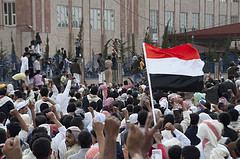
A fragmented snapshot
If all actors in Yemen where to freeze in this exact moment and somebody take a snapshot of the country it would look like this: The president and most of the government is out of the country. They are in Saudi Arabia recovering from an inside attack on the presidential palace back in early June, killing seven and wounding 87, including the president himself. In their absence the vice president is officially ruling the country, but without much real power he is exercising a cautious balancing act from his office at the Ministry of Defense, under the protection of Ali Mohsin and 1. Armored Division. Ali Mohsin is an old alley to the president and origins from the same tribe, but turned his back on the president and joined the revolution after the killing of 51 youth protesters in Sana’a on March 18. He has taken half the military with him and Sana’a is currently divided between the checkpoints of 1. Armored Division and the Republican Guard still loyal to Saleh. While loyal to the revolution, Ali Mohsin and his soldiers remains on the payroll of the government, money they spent on giving military training to the peaceful youth protesters. The president’s son, Ahmed Saleh, has moved into the presidential palace from where he together with his cousins continues to exercise the real power – or at least the power the government has left. In the southern province of Abyan militant Islamists are fighting against the military and local tribesmen. The Islamists has seized control over the city Zinjibar and while the soldiers of the 25. Brigade fighting against the Islamists are no longer receiving salaries, most people believe that the Islamists are funded by the government to prove Saleh’s point; that without him as ruler Yemen will be consumed by chaos. USA has launched an extensive drone program in the south, a program which legal fundament remains questionable. North/east of the capital in al Jawf province Houthi rebels from Sa’ada are fighting against local tribes loyal to the opposition party Islah.
Not far from the fighting, at the revolutionary square in Sana’a, Houthis are sitting together with Islah party members, chewing qat and planning the revolution. A tribal alliance consisting of sheikhs from all of Yemen’s powerful tribes have announced that Saleh will not rule Yemen again, as long as they are alive. Yet splits exist within all tribes, especially the president’s own, and loyalty is divided. Just outside the capital in Arhab district the government is bombing local tribes, yet has not managed to defeat them. The government says the tribes of Arhab are trying to take over Sana’a International Airport and the strategically important Sama military base, while the opposition argues that the tribes are fighting to block Republican Guard soldiers from reaching the capital. The bombs can be heard in Sana’a and the airport is frequently closed for flights. Confused yet? Then it might not help to mention the interference from the regional superpower Saudi Arabia or the global, USA. Both remains deeply involved in the conflict, USA driven by a counter terrorism narrative and Saudi Arabia by a combination of concern for national security and domestic legitimacy. It is not in the interest of neither Saudi Arabia nor USA that Saleh returns, yet he is determined to do so. Saleh’s has openly stated his plan for Yemen; to leave the country as it was 33 years ago, when he resumed power, meaning a country fragmented by conflict and lack of a central state. Why would he want that? Would be a reasonable question, and the answer is as absurd as everything else in Yemeni politics; to prove that he, and only he, can rule a country where half the population owns a weapon, tribes are in de facto control most places and where the everyday life of the majority of the population, who remains the poorest in the Arab region, is dictated by a mixture of religion and consumption of the mildly narcotic plant qat. Half the population is illiterate and unemployed. Malnutrition levels are comparable to sub-Saharan countries and the country is running out of water as well as oil, the last making up 75 pct. of the state income. This was the statistics before the crisis started earlier this year, since then there has been an acute shortage in fuel, leading to an increase in prices on basic goods such as water, food, cooking gas and fuel reaching as high as 400 percent on some goods. How the regular Yemeni survives remains a mystery.
This snapshot is not just complex it is also pessimistic leaving little hope for Yemen’s prospect as a united country heading towards democracy and rule of law – the objectives of the youth revolution. Nobody knows what will happen next, but most seem to accept that full blown civil war is a likely scenario. But even with this accepted, the war remain a semi reality. It is not here yet, but it is still affecting our lives. It might never come, but we will only know for sure when it comes. It is a distant circumstance of our lives yet a very real part of our future. So while we are waiting for the war that might, might not, come, maybe tomorrow or maybe in a year, we continue to live our lives. And life in Yemen these day mainly consist of two activities; overcoming practical challenges and gathering in qat sessions discussing politics.
Enemies gather in the mafraj
The practical challenges might seem trivial compared to the bigger picture, yet they take up a lot of time, planning and resources. Take for example an easy task such as having a functional cell phone. There are three main cellphone providers in Yemen; Sabafon, MTN and Yemen Mobile. All three used to have their share of customers, but then the revolution came and with Sabafon owned by a key opposition figure and businessman, it was sabotaged by the government. Having Sabafon you can no longer call landlines or receive international calls. So the customers shifted to MTN, which in turn doesn’t have the capacity for that many active phones, resulting in poor coverage and frequent shut down of the network. That leaves Yemen Mobile. Having been unable to use my MTN phone for a couple of days, I decided to get out and buy a Yemen Mobile phone card. First step was to find a friend with fuel enough to take me to an ATM and then a teleshop. Having found a friend willing to help, next stop was an ATM. Yet my international visa card only works in one ATM in Sana’a and this happens to be a bank owned by the same opposition figure owning Sabafon. For the same reason the bank is short of cash, and to prevent people from withdrawing too much, they frequently turn of the power to the ATM. Simple solution, a lot of headache. It took me three days of going back and forth to the bank, until I finally had luck and managed to withdraw some cash. Right away my friend and I went out to buy the new phone card, only to find out that most teleshops where closed due to power outage. After a two hours search my friend and I found an open teleshop with a generator and I delivered the cash, a copy of my passport and my visa plus fingerprints and got a Yemeni Mobile phone card in return. Problem solved, until I got home and put my new phone card in my phone, only to learn that Yemen Mobile only works on certain phones and mine where not one of them. Next day’s project was then to repeat the procedure, but this time to buy a new phone. A trivial practical matter of getting a new phone card thus took me a week and the procedure would be the same for almost everything. With no electricity, fuel or gas moving around, making a photocopy, getting fresh food, cleaning, doing laundry, making a cup of coffee, checking your email and almost all other daily activities turn from routine to projects.
When not engaged in solving the challenges of everyday life people meet in qat sessions to exchange the latest rumors and discuss political ideas. The growing and transportation of qat demands a lot of water and fuel, yet the price on qat has gone down during the crisis. As most other things this is blamed on the government, not because people are very unsatisfied with the cheap qat, but because qat keeps people calm and thereby prevents the public protests from escalating. Yet qat also serves to keep the political discussions alive and bring together people from fighting fractions. It is not unusual to sit in a qat session where half the mafraj supports the president and the other half the opposition. Discussion can be heated, but after the initial hours of loud exchange of opinions the qat will kick in and bring people into more intimate and low conversations one to one. By the end of a qat session political enemies put their guns back in their belt, grab their flashlight and leave back out in the dark night where the sound of machineguns can be heard in the streets. In qat sessions without competing political interests among the attending the subject of debate will instead be the many rumors surrounding almost every event. In a country where free media has been interpreted as free fantasy depending on the political affiliation of the owners, nobody really trusts any media. Instead information flows through informal networks and personal contacts. In Yemen there is no such thing as one political reality or one truth. It is the rumors that shape peoples life and creates powerful imperatives. And they travel fast. You might hear a certain rumor in a qat session with politically connected and well educated Yemenis, only to hear the same rumor being retold by your illiterate neighbor later the same evening. When presented to a Western audience, most rumors would appear to be nothing but fantasy driven conspiracy theories. Yet in the history of Yemen there is no conspiracy theory unlikely enough to later turn out right. No matter the subject, there is always more to it than the official story which also is the reason, that international media tends to get Yemen wrong.
So is it all black everything? No, it’s neither black nor white. Yemen is neither going to turn into a new Somalia nor a new Saudi Arabia. Yemen needs to be taken for what it is, an ancient civilization with a long tradition of mediating conflict, managing competing power interests and overcoming crisis. A country currently facing the biggest political and financial problems in its history and therefore urgently needs the assistance of the international community, not to fight Al-Qaida, but to feed it’s children. A country so complex that nobody, not even the Yemenis, will ever be able to fully grasp it. And while the future looks everything but bright, we will continue to live our lives – in the vacuum waiting for the war, through the fighting and destruction during a war and in the new reality that will follow a war. Not because it is possible, but because giving up is impossible. And from what we hear, the war might never come.
Siris Hartkorn is currently working as a security consultant and political analyst. She is now permanently based in Yemen but it is her fifth time in Yemen since 2009, the other times she has been there to do research. In the fall she was based in Somalia and Kenya for DDG.

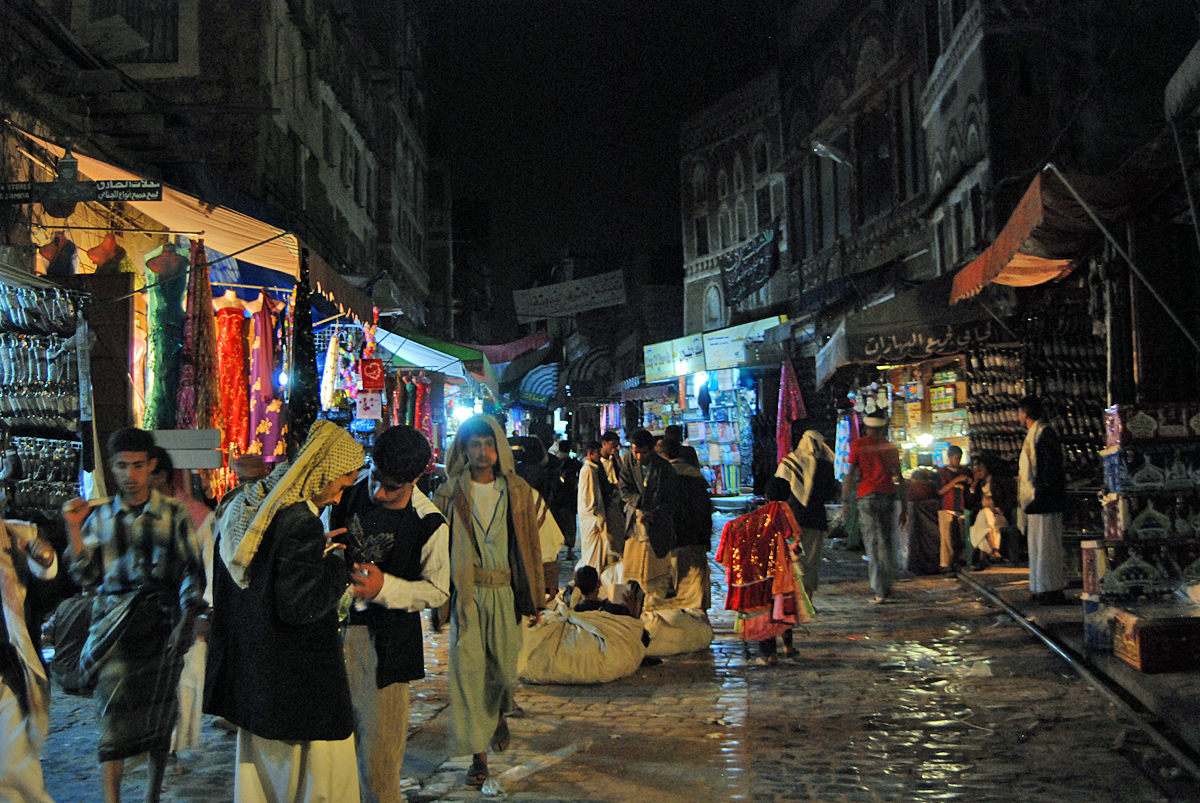
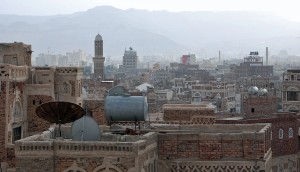
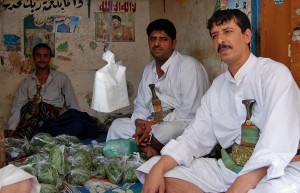
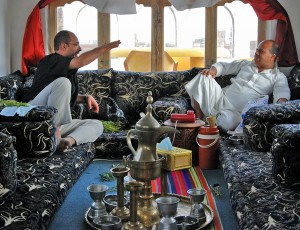
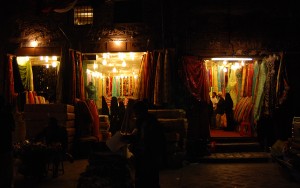
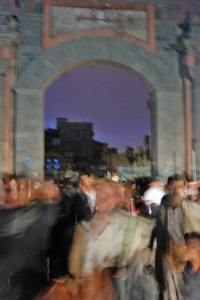
Greetings
Hello Mikael
I have just visited the Transformative Blessing that is your
home on the web. You are a talented individual who inspires.
Your gifts connect you to the Universe. By sharing who you are
you breathe in the richness of life. I found everything of great
interest. You set an example for others. You have my utmost
respect. I wish you a life of amazing and wonderful surprises
where love is your constant companion.
May you flow with grace as you fulfill your true hearts desire
and may you find your own beauty as you cultivate self awareness
and live consciously in the moment.
Yours in Evolving Spirit
Micheal Teal
The Ancient One
http://www.writerscafe.org/oldman
http://niagaraspiritualnexus.blogspot.com/
http://obliozero.blogspot.com
http://architectsofanewdawn.ning.com/profile/TheAncientOne